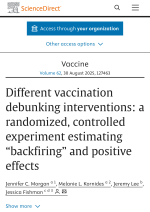We are stunned.
A new taxpayer-funded study shows just how far the medical establishment will go to make sure Americans fall in line with the COVID vaccine agenda.
Titled
“Different Vaccination Debunking Interventions,” the newly published paper isn’t about developing safer vaccines, studying side effects, or investigating long-term risks.

Instead, researchers (with significant conflicts of interest with big pharma) wanted to learn how to convince skeptical Americans to get
several COVID-19 shots.
The University of Pennsylvania researchers earned praise from the media for uncovering the “best ways to debunk COVID vaccine misinformation,”
particularly among the vaccine hesitant.
There’s a clear conflict of interest here, however.
Penn Medicine describes itself as “home to the breakthrough messenger ribonucleic acid (mRNA) technology that enabled the highly successful COVID-19 vaccines from Moderna and Pfizer-BioNTech.”
As proof they’re interested in profit, Penn Medicine is currently engaged in nasty litigation with BioNTech over hundreds of millions of dollars worth of COVID-19 vaccine royalties.
Dig deeper and the funding trail raises even more red flags.
The paper openly acknowledges support from the National Cancer Institute (NCI) — a federal agency that runs on taxpayer money.
Even more troubling, the research came out of the Penn Institute for RNA Innovation. This institute is primarily funded by the National Science Foundation, another taxpayer-funded body. And the Penn RNA institute isn’t some neutral player: it is a leading cheerleader for experimental mRNA platforms — the very technology behind the controversial COVID vaccines.
Lead author of the study, Jessica Fishman, emphasized how this research is critical to increase vaccine uptake: “part of ensuring broader distribution of vaccines is having a proven way to deliver factual information about them."
Conflicts of interest(s) aside, the research itself smears valid concerns over the COVID-19 vaccine as “misinformation” and “myths.”
As the background section begins, “misinformation about vaccines can hinder efforts to increase immunization rates.” One of the “myths” tested in the study, for example, was that “the COVID-19 vaccine causes infertility.”
890 adults with vaccination safety concerns were exposed to one of the three types of myth-busting strategies and then completed a questionnaire to gauge their intent to receive the vaccine or booster.
“People hesitant about getting a COVID vaccine were more likely to consider getting the shot after hearing a myth explained and corrected with facts,” concluded the study.
This study is just one example of a broader campaign: rebranding skepticism as “misinformation” and treating dissent not as debate, but as a psychological obstacle to be managed.
Instead of answering critics with transparency, taxpayer-funded research is being poured into behavioral science experiments that boil down to persuasion and compliance.
The medical establishment isn’t studying the vaccine.
They’re studying
you.

